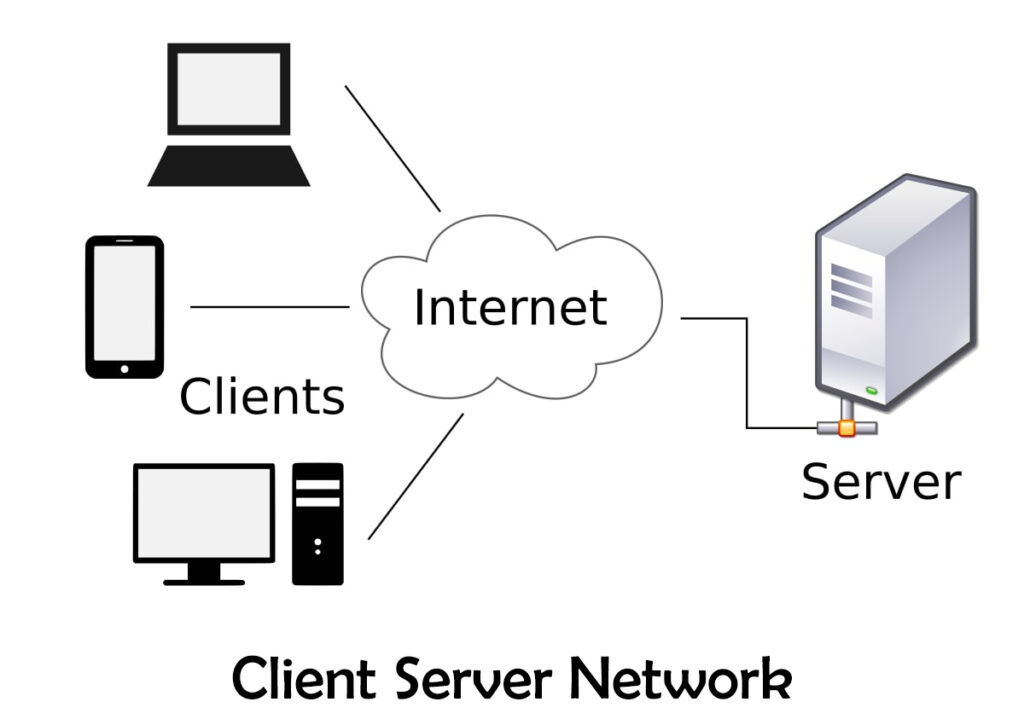Advantages and disadvantages of client server network
The client server network is a type of network in which one computer behaves as a client and the other computer behaves as a server. The client is a computer that gets services from the server. And the server is a computer that gives services to the client computer.
In a local area network (LAN) a server can be connected to many client computers and printer. Suppose there are 5 client computers and one printer connected to the server. If computer 1 wants to send some files to computer 2 then computer 1 first sends a request to the server and then the server connects computer 1 to computer 2. Computer 1 sends files to computer 2 through the server. Similarly, if computer 1 wants to access the printer so server helps computer 1 to connect to the printer.
In a wide area network (WAN), the client is a computer who wants to access the google.com website. Google.com web server responds to the client computer by sending its data to the client computer or browser. Similarly, your mobile behaves like a client and the mobile tower behaves like a server. Your mobile makes a call and the mobile tower connects your call to another mobile.
A client can be a smartphone, tablet, computer or laptop. And a server is a special computer with more resources than a client computer. A server can be a file server, database server, or print server.

Now let’s discuss some pros and cons of a client server network.
Advantages of client server network
Scalability: New clients and servers can be added to the network to make it a wider network. For example, if there is high traffic that is accessing the web server then you can attach one more webserver to your website.
Store files: A server can store a lot of files and if any client needs any file then it can access the files from the server computer.
Expand server: You can add more storage capacity to the server if you have more files to store. You can add one more hard drive to the server easily to expand server storage.
Centralized control: All the requests of clients goes through the server computer. The server has a centralized control and no client can take over the control of a server. The server responds to every client computer request. The server computer gives its resources to the client and maintains the security of its data.
Easy maintenance: New technology can be added easily through the server. Server resources can be decreased or increased depending upon the client request. If any server computer needs to take backup of its data then control can be shifted to another server. The data backup can be taken at a time when there are fewer requests to the server.
Dedicated server: A server can be either a file server, print server or database server.
Backup and recovery: Taking backup of data and recovering data is easy.
Accessibility: A server can be accessed remotely through multiple platforms.
Disadvantages of client server network
Traffic issues: Sometimes requests from clients become very high so it is difficult to manage all requests from the server.
Very expensive: The server computer needs to have a high processor and initial investment to buy server is high.
Server dependency: Client computers have to always depend on the server computer. If the server fails then all the network stops working.
Extra staff needed: To manage a server, the extra staff is needed. A network administrator is needed to look after the server.
Example of client server network
- An example of a client is a mobile device making a phone call, a browser opening website.
- Example of the server is a mail server, database server, file server, and web server.















![Toni Kroos là ai? [ sự thật về tiểu sử đầy đủ Toni Kroos ]](https://evbn.org/wp-content/uploads/New-Project-6635-1671934592.jpg)


